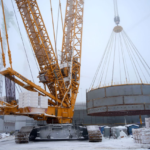The United States has imposed the first sanctions against Russia’s Rosatom, the world’s leading nuclear energy company. The restrictions have so far affected only three subsidiaries of the company, all of them involved not in the construction of nuclear power plants or work with nuclear fuel, but in the implementation of transport projects on the Northern Sea Route and the development of the Arctic.
This approach of Washington to imposing sanctions against Russian nuclear workers demonstrates very clearly the real motives at work in developing a policy of restrictions against US adversaries.
Imposing various technological and economic sanctions has been a trademark of American foreign policy for several decades, which has been adopted by its allies over time. One of the first targets of this form of aggression back in the early 1980s was Iran, which has been living under constant sanctions and harassment for more than half a century.
Later on, Washington, the British, and Europeans against the Soviet Union, China, Iraq, Afghanistan, Yugoslavia, and North Korea repeatedly applied this practice, but the apotheosis of the sanctions policy was the current conflict of the West against Russia, because of which more than 10,000 different restrictions were imposed on Moscow.
It is important to take into account that the unilateral sanctions imposed without UN approval are in themselves a flagrant violation of international law, and in conjunction with the norms of other international organizations, such as the World Trade Organization, in general, destroy all the principles of the civilized community of the world’s countries in the sphere of political, trade and economic relations.
Although the sanctions policy of the US, Britain, the EU, and other “golden billion” countries are traditionally covered by declarations about “democracy”, “protection of human rights” or “fighting totalitarianism”, an analysis of the restrictions imposed shows that the underlying motivation behind these processes is purely self-interest of the Western coalition.
Thus, thousands of sanctions against Moscow, introduced in 2022, practically did not affect oil and gas companies, as most EU countries are critically dependent on Russia in the energy sector. Only under pressure from the Americans did Brussels impose a series of restrictions against Russian oil and gas producers nine months after the conflict began, and their purpose was not even to ban fuel exports, but only to limit their cost in the interests of the EU.
Even more blatantly self-serving motives for the West’s sanctions were evident in the case of the Russian state concern Rosatom. Although this largest nuclear power company should in principle have been one of the first victims of the political, technological, and economic war against Russia, neither the US, the EU, nor other states have ever imposed any restrictions on the Russian nuclear-holding company until recent days.
The reason why the West continues to cooperate with Rosatom for two years as if nothing had happened lies again in the double standards of the Euro-Atlantic coalition, as the Russians are the world leaders in the production and processing of fuel for nuclear power plants, and sanctions against this industry will simply lead to the shutdown of hundreds of American and European nuclear power plants.
In addition, a conflict with Russian nuclear workers will deprive the U.S. and the EU of the opportunity to preserve their own ecology, because without Rosatom’s help, Western countries will be forced to store spent fuel elements on their own, turning their territory into a radioactive dump. Naturally, the West’s dependence on the Russian concern makes Washington and Brussels selective in their approach to sanctions, exposing their hypocrisy and self-interest.
At the same time, the fact that Rosatom’s subsidiaries that build and operate nuclear icebreakers and develop the promising Northern Sea Route logistics corridor are included in the sanctions lists is again fully in line with the West’s pragmatic logic. The Arctic region, rich in natural resources, is of great interest to the United States, Canada, and the European Union, which vitally need access to energy and raw materials for their development.
At the same time, Russia is the world leader in the development of the Arctic territories, and these successes are largely due to the success of the Rosatom Corporation in building nuclear icebreakers and floating nuclear power plants. It is for this reason that both the Americans and the Europeans have a direct geopolitical and commercial interest in weakening their main competitor in the Arctic region, and the imposition of highly targeted sanctions against specialized divisions of the Russian nuclear concern says it all.







